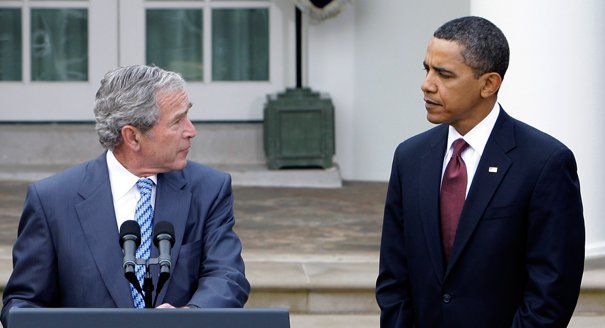
We’re supposed to believe that the main reason for reelecting Obama is to NOT return us to the policies of his predecessor, George W. Bush.
This argument presupposes that Bush’s policies were dramatically different from Obama’s.
Is that true?
George W. Bush increased government regulation. He manipulated the mortgage and banking industries, and provided huge subsidies for them when his government interventions failed. He worked to keep income taxes at a level higher than the Reagan era but lower than the Clinton era. He expanded the role of government in medical care by introducing the Medicare prescription drug program. He sent soldiers overseas to fight in wars without any specific purpose, for which no clear definition of victory was ever provided. Bush expanded domestic spending, especially for education and social services. Under his watch the deficit and the national debt expanded significantly, at historically high levels.
Barack Obama increased government regulation. He supported legislation to manipulate the mortgage and banking industries. He also supported manipulation of the auto industry through subsidies and buyouts. He kept income taxes at a level higher than the Reagan era but lower than the Clinton era. He expanded the role of government in medical care by fighting for the passage of ObamaCare, which extends Medicaid and Medicare to most of the population. He sends soldiers overseas to fight in wars without any specific purpose, for which no clear definition of victory is ever provided. Obama expanded domestic spending, especially for education and social services. Under his watch the deficit and the national debt expanded significantly, more than ever in history.
I don’t see a difference here. Do you?
I’m not saying there are no differences between the parties. But on the biggest issues of the day — defined as the issues which affect ALL of us, defense and economics — there’s not really all that much difference.
Nobody is pointing this out. I understand why Democrats prefer Obama over Bush. Under Obama, they get even more nationalization of industry, socialization of medicine, and deficit spending for social programs. But I don’t see why they’re so threatened by Bush. Under Bush, they got most of what they want.
For many, many decades now, the Democratic Party has set the agenda. We have had Republican and Democratic Presidents, and each party has controlled Congress at different times. But the initiatives are always those of the Democrats: increased domestic spending, increased regulation of the private economy, and increased taxation. For a brief interlude in the 1980s, Ronald Reagan took partial control of the agenda (domestically speaking), but only on the issue of taxes. Beyond that, it has been a Big Government, socialistic run for the better part of a century now.
How well is that working out for you, America?
If more Americans took the time to only study a little bit of history, they’d see what I’m saying is true. In the case of the 2012 presidential election, you don’t even have to study more than the last decade. Observe Bush’s record and observe Obama’s. In principle, they’re no different. If Bush’s policies were so bad, then why should Obama’s policies — based on the same exact principles of Big Government — have promised any better results?
When Obama came to office, I predicted he would fail because his policies (under Bush) had already been tried. That’s exactly what happened. Things have not improved, and in some respects — such as higher unemployment — they’re even worse. The full impact of Obama’s biggest “accomplishment,” socialized medicine, has yet to hit home. That’s because he didn’t allow it to go into effect until the first year of his second term. The same applies to tax increases. They’re coming all right, but not until he has started his second term. What does that say about Obama’s confidence in his own policies, that he wouldn’t allow them to take effect until after his reelection?
The answer is not a third party. It’s a second party. Unfortunately, the Republican Party, time and again, allows itself to get distracted by “social issues.” They take their eyes off the ball, i.e. off the most central issue, which is the economy. This keeps us from ever having any real alternative to the economic socialism of the Democrats. The Democratic Party continues to run the show, almost uninhibited, by controlling the agenda. Have there been any real cuts in programs since the Republicans came into power in the House? No way. Every time the national debt limit must be raised to pay for more spending, the Republicans huff and puff, and say they’ll never give in on spending. Speaker of the House Boehner is doing it again. Does anyone take this man seriously? The last time we went through this, Boehner settled for massive defense cuts which will go into effect — you guessed it, at the start of Obama’s second term. Half of the Democratic Party probably cheers these cuts, and the other half may be concerned, but not nearly so concerned as they are about continuing to expand social programs. It’s the Republicans who lost this battle, just like they always do.
The disasters of the present day were a long time coming. The disasters yet to follow, and they will on our current course, are also the inevitable outcome of an economy in which political forces are constantly using force, pull, manipulation and intimidation to achieve political — not economic — ends. Under the presidencies of Bush and Obama, things got even worse because these two presidents were big fans of Big Government at a time when the economy could afford no more Big Government.
Blame Bush and Obama for our current problems — not one or the other. And find someone completely different the next time around.
